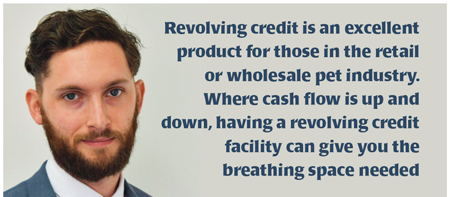Most businesses will need to arrange finance at some point, whether it’s to manage cash flow, drive the business forward or buy property. Gary Hemming, of ABC Finance, navigates the options in commercial lending
The commercial finance market has seen wholesale changes over the last five years as technology has revolutionised the way that the industry operates.
More and more lenders are entering the market, application processes are becoming faster and more straightforward.
Although this is great news for business owners, the increased choice and new names in the market can make things confusing. To combat this, I will break down the products available, when they should be used, the likely costs and timescales for the average application.
Buying or refinancing a property
When looking to buy or refinance a commercial property, the most suitable product is usually a commercial mortgage. Commercial mortgage lenders will usually allow those in the pet trade to borrow a maximum of 75% of the property value, which is known as the loan to value, or LTV.
The lowest rates are usually available up to a maximum of 70% loan to value, with rates starting from around three per cent per year. Commercial mortgages can take six to eight weeks to complete, so aren’t suitable when funds are needed quickly.

Where funds are needed urgently, or heavy works are planned to your property, bridging loans should be considered. They can usually be arranged in seven to 10 days, although they do come with significantly higher costs, typically seven to 12% per annum.
Due to the higher costs, you should always seek specialist advice if considering this route.
Raising capital
The most common means for those looking to raise cash is an unsecured business loan. Due to the rise in new lenders entering the market, there is now more choice than ever, with online lenders becoming a viable alternative to high street banks.
As the process has become simplified, business loans can be completed in five to seven days. The rate charged will depend on the trading history, credit history and the perceived risk of default.
Business loan rates start at 1.9%, but rates from seven to 12% are common for most applications.
An alternative to the business loan is a merchant cash advance. Merchant cash advances, also known as business cash advances, are available to businesses with strong sales through a card terminal.
Unlike most types of borrowing, there is no set interest rate. Instead, a pre-agreed repayment amount is set. For example, an advance of £10,000 could have a set repayment of £12,000. To make the repayments, a percentage of future card payments is automatically deducted until the agreed figure has been repaid.
Merchant cash advances benefit from a very simple application process and can be arranged in two to five days.
Controlling your cash flow
When looking to control your cash flow, there are two products that may be suitable. The first is a business revolving credit facility, of which the most commonly understood are the overdraft and credit card, which often have a set limit. Funds can then be drawn and repaid as needed as long as the account sits within the agreed limit.
Revolving credit is an excellent product for those in the retail or wholesale pet industry.
Where cash flow is up and down, having a revolving credit facility can give you the breathing space needed. Facilities are generally available from £1,000 up to £250,000 and can often be arranged in one to two days.
On top of business overdrafts and credit cards, there are a number of lenders who can offer standalone revolving credit.
Always get more than one quote as interest rates can vary widely.
For those offering products on delayed payment terms, invoice finance could be an ideal way to control cash flow. Invoice finance allows you to release up to 95% of the value of an invoice immediately, even if it’s on 60-90 day payment terms.
Invoice finance comes in different forms, with some products transferring your credit control to the lender and others allowing you to retain it in-house. By using an invoice finance facility, you are able to fund much larger orders without your cash flow causing problems, so although there is a cost to it, it can be used to grow your business.
Who is ABC Finance
Family management team ABC Finance arranges funding for commercial clients across the UK.
Gary specialises in bridging loans, commercial mortgages, invoice finance, asset finance and business loans. More information at abcfinance.co.uk



